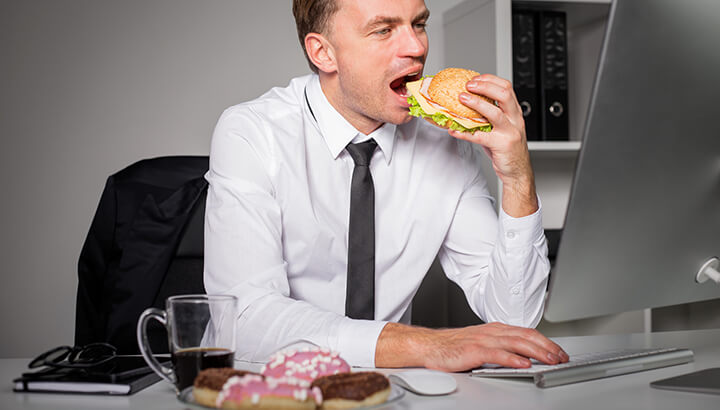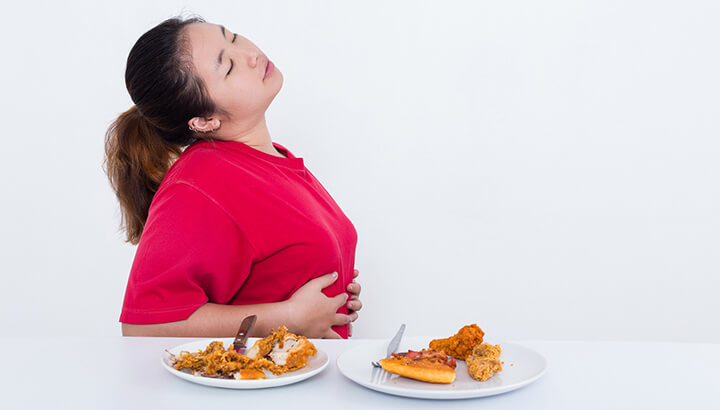
Let’s start off by saying that being an emotional eater often gets a bad rap. Much of the eating we do is emotional. Think back to holiday meals, for example. You probably have a lot of positive memories associated with time spent with family. When you enjoy the foods you typically eat at the holidays, it has an emotional impact. And this is a good thing. So eating with emotion in itself is not a bad thing. But sometimes, emotional eating can be destructive. If we emotionally eat to the point where it affects our health, or if we’re doing it to fill another need, it can be detrimental.
Here are 10 signs that will let you know if your emotional eating may be taking a destructive turn.
1. You use food to comfort yourself
This isn’t always a bad thing. A cupcake when you’re feeling down might just do the trick. But if you’re consistently doing this — or if you’re doing it with large amounts of food — it can become a problem. It can also be a distraction that may not be benefitting you. If you’re turning to food to soothe yourself, rather than addressing the real issues in your life, you’re actually doing yourself more harm than good in the long run.
2. You lack other coping mechanisms

If food is your only — or primary — mechanism for coping with difficulties in your life, it may mean that your emotional eating has gotten to the point where it’s doing you harm. Are there other things that you do to cope with stress or challenging emotions? Exercising? Calling a friend to talk it out? If not, try finding other coping techniques and engaging in those the next time you feel the urge to use food to soothe your emotions.
3. You eat when you’re not hungry
We all do this from time to time. And occasionally, it’s okay to indulge. But if you’re routinely eating even though you don’t feel hungry, it’s definitely something to pay attention to. It could be a sign that you’re staring down the path of emotional eating.
4. You eat too much, too fast

Emotional eating can sometimes lead to binge eating, wherein you eat large amounts of food fairly quickly. Those struggling with this often report feeling out of control when they’re eating. Binging may be the result of a number of issues, and emotional eating is one of them.
5. You’re afraid of not getting your share
Have you ever found yourself eating because you’re afraid of missing out on the enjoyment of a particular meal or food? Like eating a donut because all of your co-workers ate donuts and you don’t want to miss out. Or having a glass of wine at a party just because you don’t want to be the only one not drinking.
Let’s break it down. If you’re using food to fill an emotional void — or if food is a primary source of happiness in your life — then the enjoyment of food takes on much more significance for you, and so does the fear of not getting your share of that enjoyment.
6. You judge your body

To be sure, judging your body does not always mean you’re an emotional eater. Many of us, especially women, have negative thoughts about our bodies at some point, unfortunately. But if you suspect you may be emotionally eating, take a look at your relationship with your body. When we emotionally eat, it often causes us to feel guilty (which is unnecessary!), and to feel even worse about ourselves. And this will often negatively impact our body image.
7. You’re embarrassed about food
Are you ever embarrassed to talk about what you’ve eaten? You’re not alone. Many of us fear that others will judge us for what we eat. It’s as if we think we can only eat salads, or others will think we’re gluttonous. And this is often heightened when we emotionally eat because our relationship with food has become even more warped. If you prefer eating alone, or you don’t like talking to others about what you eat, this could be a sign of emotional eating.
8. You make food the enemy
When we emotionally eat, we often have a love/hate relationship with food. On one hand, we use food to give us comfort and to soothe us when we’re feeling stressed, anxious or depressed. But on the other hand, we often feel guilty for eating. We see food as a forbidden fruit (no pun intended). It’s something we want, something that brings us enjoyment, but also something we’ve told ourselves we’re not supposed to have too much of. So rather than seeing food for what it is — something that nourishes us and actually has a great capacity for healing — we see it as the enemy.
9. You’re preoccupied with food
We all go on Instagram at times and drool over the food pics. But if you find yourself frequently looking at photos of food you think you “shouldn’t” have, or feeling emotional pangs when you eye the baked goods in the grocery store, these are signs of emotional eatinng to be aware of.
10. You have theoretical perfectionism
Often, when we emotionally eat, we’re well aware that it’s not a healthy habit. But it’s so easy to find fault in ourselves — and many of us have a tendency to blow the “imperfections” in our diet way out of proportion, and to jump to the conclusion that if we can’t have perfect diets, it’s not worth trying to be healthy. Or we tell ourselves that we don’t have the “willpower” to maintain a “perfect” diet, so there’s no use in trying. But the truth is, any improvement you make to your diet will be beneficial — no matter how small.
How to stop being an emotional eater
The most important step is to do what you can to start loving yourself, exactly as you are. So often, we emotionally eat to fill another void in our lives, and that void often has to do with feeling “not good enough” in some way. But remember, you are good enough! You are a perfectly worthy, valuable person exactly as you are in this moment.
The next step is to start trying to eat mindfully. Often, when we emotionally eat, we do it without really paying attention to what we’re doing. We’re so desperate for the happiness we think food will give us that we just scarf the food down. Instead, try slowing down and truly enjoying your meals. When you can, make it a bit of a ceremony. Eat from your nice dishes, turn off the TV and phone, light a candle. Really be present for your meals. This will make you more aware of what you’re doing and likely curb the desire to emotionally eat.
— Sarah Cooke

